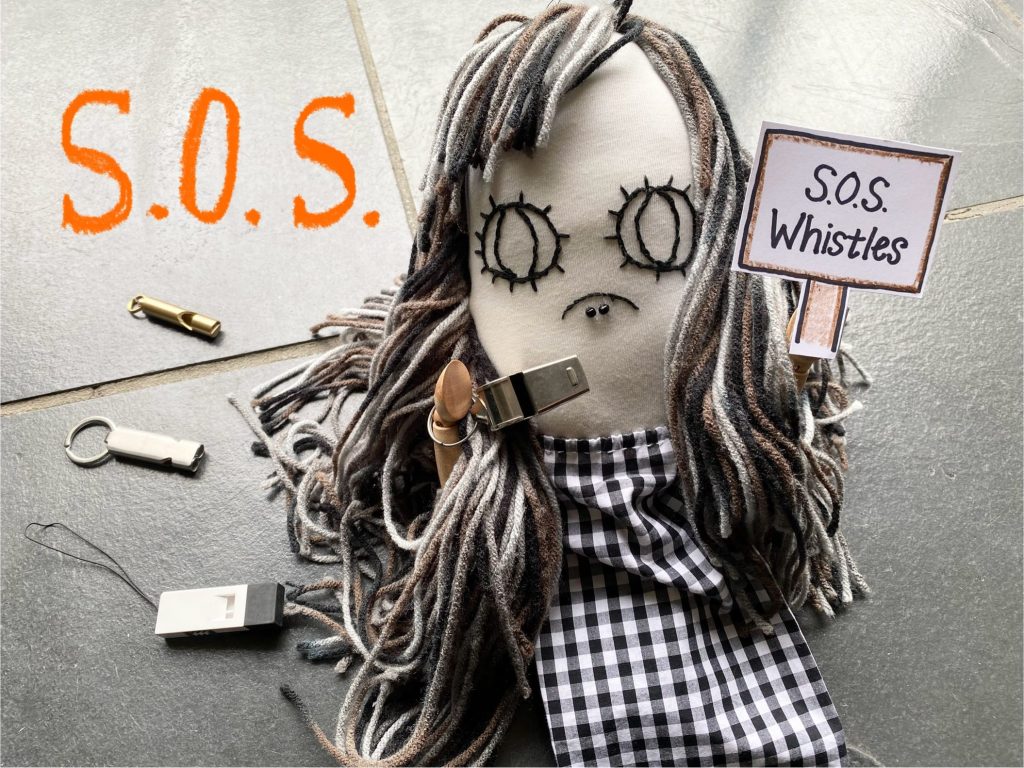
Why do we need a whistle for emergencies?
“A whistle?? Why would we need that?”
“I’m sorry, I don’t want to carry a whistle all the time.”
“My kids have some whistles they’ve been using as toys.”
First of all, please forget about relying on your cell phone in emergencies. Having other skills and ideas will help you tremendously. Please consider an item which is easy to overlook: the humble whistle. The whistle is not just a kid’s toy. As we all know, many professionals depend on their whistles to do their jobs: e.g., policemen, firefighters, lifeguards, and sports referees. We can use the whistle as a signal, to call for help.
How long has it been since you last used a whistle? I mean, really cut loose with it? Since I became an adult, I haven’t blown a whistle with all my strength. I’ve been too worried about my neighbors. Plus, the only real reason I would have had to blow one would have been to demonstrate the whistle to my kids, back when they were little. How about you?
Whistles are small but loud. For such a small item, they pack a big punch. Why don’t you carry one all the time for emergencies? It’s OK, even if it’s a toy whistle, temporarily. But after you read this post, I recommend you get a good one. It’s probably the best bang-for-the-buck item you can have on your person, in a major disaster, emergency, or other survival situation. You saw Titanic, right?
The purpose and benefits of an emergency whistle
• The sound of a whistle will attract rescue personnel to your location. The sound is very reliable and will help in most disaster rescue operations.
• Even with very little blowing effort, whistles can make a very loud sound. Children and elderly, even with limited lung capacity, can make loud sounds, easily.
• Useful for crime prevention. Children, women and elderly can carry a whistle easily as an anti-theft tool.
• For communicating with others. Whistles can be used to coordinate group movements and actions, effectively.
• Always on. Whistles are low-tech. They don’t require batteries, electricity, wi-fi, or a signal or anything. When electronic devices are affected by network outages or power disruptions, whistles will still work.
• Works on the run. You can run and blow a whistle at the same time. This is useful when there is no time to use a cellphone or while you are running away from an attacker.
• Can give a signal quickly. The signal travels at the speed of sound.
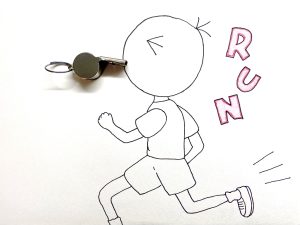
Which whistle?
Here are some points you should consider when choosing an emergency whistle.
- Your whistle needs to produce sounds over 100 decibels (dB) to be heard clearly, especially in noisy environments or at a distance. Louder sounds are necessary for effective signaling and communication.
- The human ear is most sensitive to frequencies within the 2000~5000 hertz (Hz) range. If a whistle is capable of producing that, it will be good. Moreover, the 3150 Hz frequency is the most readily heard tone over the noise of motors, crowds and explosions.
- Your whistle should be small, lightweight, and compact.
- Look for a whistle that is waterproof and durable.
I picked up these whistles.
★ FUTURESTEPS
This one is a very small size, and it makes a loud sound. I haven’t had it for very long, but so far I haven’t noticed any scratch marks on the whistle or my key ring.
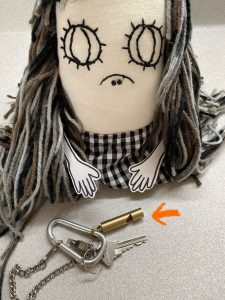
★ Kokuyo
This whistle has two frequencies (3200 Hz and 4800 Hz). My kids carry this whistle to school because it is good for crowded or noisy areas.
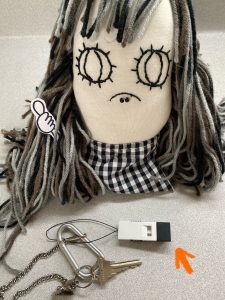
★ TISUR
These have a cool design. They are very compact and very loud.
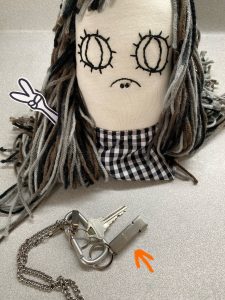
Do you know SOS Morse code?
SOS is an international distress signal.
“S” is coded as three short taps and “O” as three long taps.
●●● ⏤➤ ⏤➤⏤➤ ●●● トントントン ツーツーツー トントントン
Practice it by knocking on a table or flicking a light switch.
Do not use your whistle now, somebody might come!!
★ You need to know other ways to get rescued!
▪︎ Use a light to flash on and off repeatedly.
▪︎ Hit an empty can or metal plate to make a loud sound. (If you wear a ring, you can use it to hit something and make noise.)
▪︎ Draw an SOS sign on the ground, as big as possible.
▪︎ Make a bonfire.
▪︎ Use mirrors or reflectors to send a signal. Use the reflected light to signal a search and rescue team.
Imagine you are buried under a collapsed building, after a big earthquake.
How will you call for help? Think this through for each room in your home.
★Crush Injuries and Crush Syndrome
I’d like to take a moment to briefly discuss crush injuries and crush syndrome. You should be aware of both concepts before somebody rescues you or you have to rescue somebody.
Crush injuries and crush syndrome are common whenever victims are trapped under collapsed structures. A crush injury can cause extensive damage to muscles and tissues if a heavy object is left on top of a person for an extended period of time. When a large area of muscle is compressed under extreme pressure, it can cause muscle cell death, leading to the release of harmful substances (like myoglobin and potassium) into the bloodstream, which can severely damage the kidneys and heart, potentially causing organ failure and even death. Conditions can worsen when the pressure is released and blood flow returns to the damaged area (this is known as crush syndrome).
Three common signs and symptoms of crush injuries are pain, bruising, and swelling.
Crush syndrome can occur when extremities have been under severe pressure for as little as an hour. Most often, crush syndrome will develop when exposed to pressure for 4 to 6 hours.
For more info on this: National Library of Medicine
Believe it or not, you are more likely to be rescued by your neighbors than by firefighters or emergency personnel. It’s more often your neighbors who hear your signal and find you. After the recent big earthquakes in Japan, we found that about 80% of the people who were rescued were rescued by the people from their neighborhood. The remaining 20% were saved by rescue workers. That’s why we must not give up on signalling for help. We have to continue making sound any way we can.
See you next time.
Remember, “Protect your life by yourself” (自分の命は自分で守る). You need to survive first, and then you need your emergency supply. No matter how well you prepared your emergency supplies, if you die, then all of your preparations will have been for nothing. First and foremost, keep your health up all the time. Build your stamina so that if you need to, you can evacuate as quickly as possible. Stay healthy.